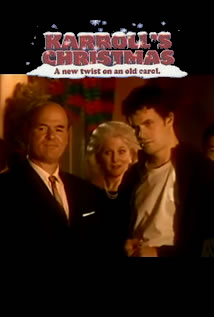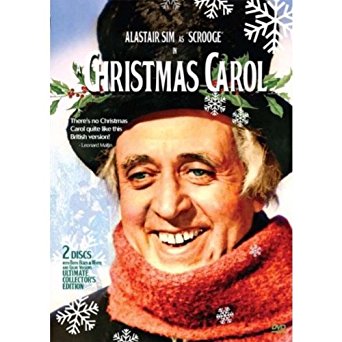(Another Christmas repost, from back in 2018)
Last year Greg Hatcher discussed why he loves A Christmas Carol despite a general distaste for Christmas because “someone finally convinces a rich asshole to stop being a jerk to everyone.” I don’t dispute that interpretation, but like a lot of classics, Dickens’ story carries multiple meanings. The one I’m writing about today is that Scrooge isn’t just a jerk to everyone around him — he’s a jerk to himself too. By the time we meet him, he’s devoted years to making himself completely alone and utterly miserable.
He rejected the woman he loved as an unprofitable investment. He cut off contact with his nephew because he thinks Fred ruined himself by marrying for love. As a young man Scrooge had love, family, friends and he let them all slip away. The only friend he has as an adult is Marley, and Marley’s seven years dead at the start of the story. Ebenezer’s redemption isn’t just about learning to treat other’s decently, it’s about realizing what he’s lost and finally reconnecting with the world.
That’s a theme that matters a lot to me. There have been stretches of my life where I felt cut off from everyone, completely alone, and unable to figure out what I was doing wrong. I couldn’t see any way to change it; at its worst, like the singers in “Thank You Very Much” (the Albert Finney musical Scrooge), “I never thought the future would be fun for me.” And I worried my own choices had led me to that situation; it was all my own fault.
Those stretches of despair passed. I’m happily married and the future which is now the present is way better than I thought it would be. I still remember the despair of feeling cut off, so watching Scrooge end his own estrangement from the human race gives me a real joy.
As covered in the excellent The Life and Times of Ebenezer Scrooge, a standard criticism of the book is that Scrooge has a god-given right to use his money in whatever way makes him happy. The flaw in this argument is that it doesn’t make him happy. His ex-fiancee Isobel called it: he’s afraid of the world and money is his security blanket (this is not the only interpretation possible of course).
With some screen Scrooges such as Patrick Stewart or George C. Scott, you can see they enjoy having money, but it’s a very narrow, limited kind of happiness. Yet they can’t seem to stretch to enjoy anything else; Ebenezer loves Isobel, but he’s happy to walk away from her rather than lose money supporting a household. As far as we know, he never sought marriage again (did he come to see any marriage as a bad financial deal?).
 This may explain why he loathes his nephew Fred. “What right have you to be merry? You’re poor enough!” is how Scrooge dismisses his Christmas-loving nephew. Yet from what we see Fred is doing quite well, living what looks like a comfortable middle-class lifestyle, able to entertain a crowd of friends for Christmas dinner. Perhaps Uncle Ebenezer’s bitter, in part, because his nephew did what Scrooge didn’t have the courage to, and chose his heart over the bottom line (the Alastair Sim film explains the bitterness as Ebenezer’s beloved sister dying in childbirth).
This may explain why he loathes his nephew Fred. “What right have you to be merry? You’re poor enough!” is how Scrooge dismisses his Christmas-loving nephew. Yet from what we see Fred is doing quite well, living what looks like a comfortable middle-class lifestyle, able to entertain a crowd of friends for Christmas dinner. Perhaps Uncle Ebenezer’s bitter, in part, because his nephew did what Scrooge didn’t have the courage to, and chose his heart over the bottom line (the Alastair Sim film explains the bitterness as Ebenezer’s beloved sister dying in childbirth).
Regardless of the reason, Fred and his wife are one more potential relationship Scrooge has willfully severed from his life. His only connection with people is monetary: those who do business with him and Bob Cratchitt working for him.
And then the spirits come. Scrooge comes face to face not only with the suffering around him that he’s been ignoring, or making worse, but with his own heart. He discovers he doesn’t want to die alone, doesn’t want to live alone. and so he changes.
It’s part of why I like Albert Finney’s Scrooge so much. At the start of the film he’s an utter misanthrope, far more miserable and bitter than Scott, Sim or Stewart; when he sees the light at last, he becomes completely jubilant. And nothing can express jubilation like a musical.
So every year I watch Dickens’ adaptations, TV Carol specials and oddball variations like 2004’s Chasing Christmas (Christmas Past quits his job in the middle of Christmas Eve, leaving Tom Arnold stranded on a visit to his own past). Sharing the joy of reconnecting matters enough to me I doubt I’ll ever stop.
I hope y’all are spending the day with someone you care about, and that we can all find some light in the darkest time of the year.
#SFWApro.

